Hopenhagen?
Air Date: Week of December 11, 2009
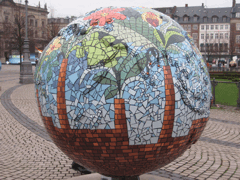
(Photo: Jennifer Stevens-Curwood)
Denmark has dubbed its capital city Hopenhagen, as negotiators from 192 nations begin 2 weeks of talks to try to work out a new agreement to deal with climate change. UN officials say they're cautiously optimistic but problems big and small could derail a deal. Living on Earth’s Steve Curwood reports on the promises and perils amid the protests and political posturing.
Transcript
CURWOOD: It’s taken 17 years to get here. It was in1992 when the UN first put together a treaty in Rio De Janeiro, Brazil to deal with climate change. Over the years there have been numerous meetings, perhaps the most important in Kyoto, Japan in 1997. The Kyoto Protocol put the first mandatory emission limits on rich industrialized nations. Now, as that Protocol ends its first phase, this meeting in Copenhagen has been called to extend and expand those restrictions on all nations that emit serious amounts of carbon – the developing as well as the developed countries.
DE BOER: I believe that this conference has already written history, that this conference will write history, but we need to make sure that it writes the right history.
CURWOOD: That’s Yvo de Boer, executive secretary of the UN Framework Convention on Climate Change. He’s in charge of the process, and in his message to the 192 nations that have gathered here in Copenhagen, he’s not asking for anything fancy for Christmas.

(Photo: Jennifer Stevens-Curwood)
DE BOER: What I would advocate for this conference, in spite of all of the attention is keep it simple. Focus on an outcome that can deliver immediate action on the ground the day this conference ends, and what I want to see at the end of this conference is a list of rich country targets, that are ambitious, clarity on what major developing countries will do to limit the growth of their emissions, and a list of financial pledges that will make it possible for the much broader developing nation community both to change the direction of their economic growth and adapt to the inevitable impacts of climate change. That’s what I’m asking Father Christmas for.
CURWOOD: Yvo de Boer is a patient, soft spoken, plain speaking diplomat, but with time running out he used atypically blunt words to remind nations of promises they’d made to strike a deal in Copenhagen.
DE BOER: And the negotiators in the week that they have, had better make damn sure that they deliver.
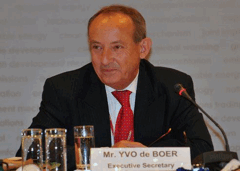
U.N. Climate Chief, Yvo DeBoer (Courtesy of the United Nations Climate Change Conference)
CURWOOD: But so far that’s uncertain. There are stumbling blocks big and small.
The largest has to do with the biggest carbon polluters: the United States and China, which between them produce half the world’s climate changing gases. The U.S. has historically been an untrustworthy party to the negotiations. In 1997, it signed the Kyoto Protocol, which required steep cut in U.S. emissions. But the U.S. never ratified the deal, nor made the cuts it had agreed to. It did ratify the 1993 Rio Climate Convention, but never honored those commitments either. But now, the Obama administration says those days are over, and it’s been sending a steady stream of cabinet level officials to make its case.
[SOUNDS OF MILLING PRESS CROWD]
CURWOOD: It was standing room only when the U.S. EPA Administrator Lisa Jackson appeared at the climate talks in Copenhagen shortly after announcing the EPA would use the Clean Air Act to limit greenhouse gases, a move designed to spur Congress to act.
JACKSON: At a moment when urgent economic and environmental issues are pressing on us from all sides, President Obama has positioned the U.S. to lead the way. We are seeking robust engagement with all of our partners around the world; we are seeking to support sustainable economic opportunities in developed and developing nations; we are seeking a path forward that rewards our mutual interests and recognizes our individual responsibilities, and we are seeking to prevent the rapid approach of climate change that affects us not as separate nations but as one earth.
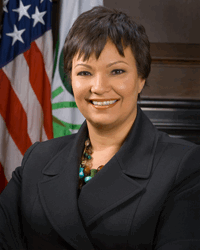
Lisa Jackson is Administrator of the Environmental Protection Agency (Photo: Courtesy of EPA)
[SOUNDS OF MILLING CROWD]
CURWOOD: But making that a reality is going to be tough. For the United States that job falls to Todd Stern, President Obama’s chief climate negotiator.
STERN: Look the bottom line here is – the United States is committed to getting the strongest possible agreement we can over the next two weeks. We are under no illusion that this is going to be easy, it’s going to be challenging but I think and agreement is there to be had if we do this right.
CURWOOD: The biggest challenge comes from China. It wants the U.S. to honor its earlier commitments in Rio and Kyoto and most recently in Bali and fulfill its legal obligations to cut emissions. Asked by reporters about that, Todd Stern was, well, stern.
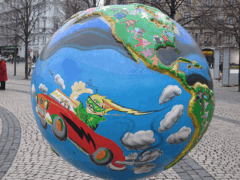
(Photo: Jennifer Stevens-Curwood)
STERN: We're not going to become part of the Kyoto protocol so that’s not on the table. We're not going to do Kyoto and we're not going to do something that’s Kyoto with another name.
CURWOOD: That’s because to be in compliance with Kyoto the U.S. would have had to make deep emissions cuts, which it hasn’t – Kyoto rules call for stiff penalties for nations that miss their targets. Now the United States wants to start anew, with a legally binding Copenhagen protocol that for first time also includes limits for China.
STERN: Right now, China is the biggest emitter in the world; by 2020, it’s going to be 60 percent larger than the United States. By 2030, it’s going to be 80 percent larger than the United States. You can't even think about controlling this problem without having significant action by China. So our emissions are pretty much flattening out right now and then they're going to go down. China – and I’m not being critical – China has an extraordinary successful economy and is in a different stage of development than we are, but emissions are emissions. You just got to do the math. This isn’t a matter of politics or morality or anything else, it’s just math. And you cannot get to the kind of reductions that we need globally if China’s not a major player, it's just the reality.
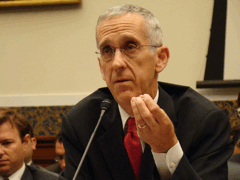
Todd Stern is the climate change envoy for the United States (Photo: Courtesy of the US House of Representatives)
CURWOOD: China’s reaction was swift and even sterner. It’s the United States that should do the math says a senior China delegate – U.S. emissions are up 17 percent since Kyoto. And he says a legally binding agreement is already available – it’s called the Kyoto Protocol, and when it begins its next commitment period, China says it will start slowing it growth of emissions. Su Wei is China’s chief negotiator in Copenhagen.
[WEI SPEAKING CHINESE]
VOICEOVER: I think all the parties should show sincerity in the protection of climate and they should be courageous enough to face up to their historical responsibilities. To solve the issue of climate change we cannot just discuss or talk we need to take concrete actions and make efforts; we need to translate our words into practice and deeds. I think both the UNFCC and its Kyoto protocol are legally binding documents.
[CROWD CHANTING; CLAPPING SOUNDS]
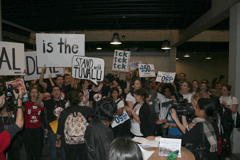
Small island nations like Tuvalu will disappear if melting glaciers cause predicted sea-level rise.(Photo: Bruce Gellerman)
CURWOOD: But it just wasn’t the world’s largest climate polluters that were heating up the climate talks here in Copenhagen. It was demonstrators protesting on behalf of one of the smallest countries, the ten square mile, Pacific island nation of Tuvalu, which would vanish in predicted sea level rises. Protestors blocked the halls of the convention center and demanded acceptance of Tuvalu’s proposal that would force both the United States and China to make even deeper emission cuts. The proposal was widely supported by many African nations, and threatened to derail the negotiations. But China, India, and Saudi Arabia moved to block it.
CURWOOD: Jennifer Morgan of the World Resources Institute has been watching climate talks since the earliest days. She says Copenhagen is different.
MORGAN: It’s just that the stakes are so much higher this time. I mean we have over a hundred heads of state coming to talk about climate change next week and seal the deal. We’ve never had that before. We’ve had heads of state on the phone in Kyoto, but we’ve never had them here. And that changes it.
CURWOOD: So, how excited are you?
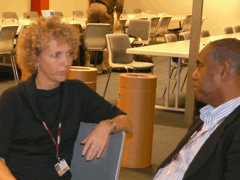
Steve Curwood talks with Jennifer Morgan (Photo: Bruce Gellerman)
MORGAN: Oh, I’m incredibly excited to be here because it’s been – you know, Copenhagen for those of us working in this field it’s kind of been – it’s like a verb, a noun, an adjective in your daily life, right? So, I’m excited that we’re here. I’m excited that there is a lot of world attention to this, and gosh, I hope that we make it worth it.
CURWOOD: So, the stakes are high. What are the super-high stakes you’re talking about?
MORGAN: Well, I think the fundamental question is whether this meeting sends a signal to the world that the major economies of the world, particularly the developed countries are serious about moving to a low-carbon economy in a binding fashion and whether the major emerging economies are also serious about taking action to move to a low carbon economy. If we don’t get that signal out of here, I don’t know when we’re going to get it. And I think that you’re seeing the high stakes also because of the island countries and Africa who are feeling panicked – that if we don’t get something moving here that window that scientists tell us is very small to avoid dangerous tipping points is closing.

The gravity of global climate change weighs heavily on Living On Earth’s Steve Curwood.
CURWOOD: The level – the public level of criticism between China and the United States is pretty high, not terribly diplomatic sounding at this gathering. What does this tell us?
MORGAN: This tells us that these are the two main deal-maker or deal-breakers in this game, and that they are both concerned about being blamed at the end of the day for any failure that might occur here, and are already setting themselves up. That’s one thing. It also tells us that what the United States does has a lot to do with what China does and what China does has a lot to do with what the United States does, and that there is a poker game going on here – both on the level of ambition and the level on bindingness around this deal.
CURWOOD: Poker game – who’s got the cards, what are they, how can they play them?
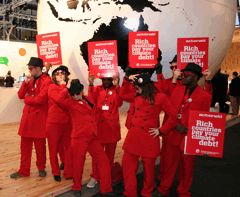
REDD protestors (Photo: Bruce Gellerman)
MORGAN: Well this is a new world that we’re in, because I think in the past the United States has held a lot of cards. For example, when China wanted to join the WTO, but now China holds a lot of the cards. China is taking significant action to reduce its emissions – it is far ahead of the United States on renewable energy laws, on fuel economy standards, on many of these items, and the U.S. needs things from China, but the U.S. doesn’t yet have a lot to give. It has a provisional target that’s not through the Senate yet, so they’re nerv – they want to put that out. It can’t put out real long-term finance because it’s not through the Congress yet. China’s looking for finance not for itself but for the most vulnerable developing countries, so I think China holds a number of cards in some ways more than the U.S. holds right now.
CURWOOD: Talk to me a bit about the demonstrations and the street theatre that’s going on here. Now, there’s always a bit of street theatre, but I saw the cops come for one of these demonstrations – seems like it’s more intense.
MORGAN: The amount of public engagement before this conference and in this conference is unprecedented. Coming into this meeting there were numerous days of action around the world, in capitals occurring. And now you see here, especially a very strong young delegation – this is their future that’s being negotiated, and so I think it will hold politicians much more accountable, hopefully, than it has in the past.
CURWOOD: Jennifer Morgan is the climate energy policy director at the World Resources Institute. Thank you so much.
MORGAN: Thank you.
Links
To Hear Lisa Jackson's Speech in Copenhagen Click Here
To Hear Todd Stern's Speech in Copenhagen Click Here
The United Nations Climate Change Conference
Union of Concerned Scientists' Alden Meyer comments on the conference progress Dec. 12th
Living on Earth wants to hear from you!
Living on Earth
62 Calef Highway, Suite 212
Lee, NH 03861
Telephone: 617-287-4121
E-mail: comments@loe.org
Newsletter [Click here]
Donate to Living on Earth!
Living on Earth is an independent media program and relies entirely on contributions from listeners and institutions supporting public service. Please donate now to preserve an independent environmental voice.
NewsletterLiving on Earth offers a weekly delivery of the show's rundown to your mailbox. Sign up for our newsletter today!
 Sailors For The Sea: Be the change you want to sea.
Sailors For The Sea: Be the change you want to sea.
 The Grantham Foundation for the Protection of the Environment: Committed to protecting and improving the health of the global environment.
The Grantham Foundation for the Protection of the Environment: Committed to protecting and improving the health of the global environment.
 Contribute to Living on Earth and receive, as our gift to you, an archival print of one of Mark Seth Lender's extraordinary wildlife photographs. Follow the link to see Mark's current collection of photographs.
Contribute to Living on Earth and receive, as our gift to you, an archival print of one of Mark Seth Lender's extraordinary wildlife photographs. Follow the link to see Mark's current collection of photographs.
 Buy a signed copy of Mark Seth Lender's book Smeagull the Seagull & support Living on Earth
Buy a signed copy of Mark Seth Lender's book Smeagull the Seagull & support Living on Earth

